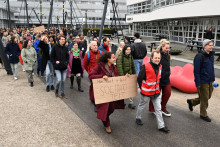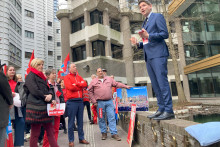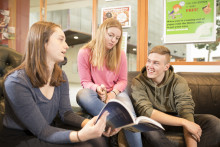Sebastiaan den Boer (23, BIT Master), Co-founder of the Space Society talks about the association that he helped found.
What is the goal of the Space Society?
‘We want to bring knowledge of space closer to the people. This can be done by getting acquiring new members and also by getting adequate funding to sponsor our projects and events.’
What projects are you currently working on?
‘We’re currently waiting for confirmation from NASA to host our second hackathon in collaboration with them. In the meantime we want to get recognised as an official student team by the end of this academic year.’
Is the student team recognition before the summer a feasible goal?
‘It comes with its challenges. To be recognised as a student team you need to be able to participate in competitions. The space industry is extremely expensive, which makes the existence of competitions quite difficult as you need a substantial amount of funding for development, testing and transporting what you make to space. Despite these requirements, we are still trying to get that recognition because if we get funded for development, we partner up with the industry for testing and if that yields good results companies would want to send our product to space. I’m confident we can get the recognition until the end of this academic year.’
The space society was founded a while ago. What have you accomplished so far?
‘We officially founded Space Society Twente in September 2018. So in this half year we hosted the Space Apps Challenge from NASA, which is the world’s largest space hackathon. We also won the ‘best part time board award’ from the Student Union.’
What are some of the challenges that you are facing as a team?
‘As a relatively new association we are still looking for members. Currently, we have around 40 members of which 2/3 are international and most of them are in their Master’s. This is not ideal as Master students do not have a lot of time to invest. We’re trying to broaden our outreach to also try and appeal to Bachelor and minor students as they potentially fill full-time positions. However, there is a relevant stigma around space that scares most people because it is perceived as difficult and hard to understand which makes finding new members tough.‘







